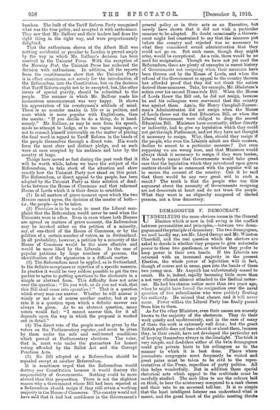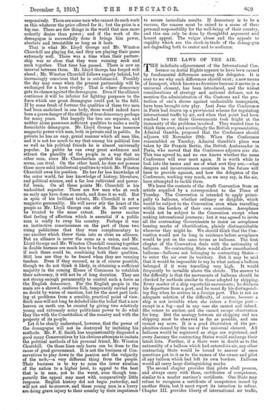DEMAGOGUES Y. DEMOCRACY. -H NDERLYING the more obvious issues in the
General Election which is now in full swing is the conflict between personalities and principles,—between two dema- gogues andtheprinciple of democracy. The two demagogues, we need hardly say, are Mr. Lloyd George and Mr. Winston Churchill, and the real question which the electors are asked to decide is whether they propose to give autocratic power to these two gentlemen, or whether they prefer to keep power in their own hands. If the Liberals are returned with an increased majority in the present Election, the whole power of legislation will in fact, though of course not in name, pass into the hands of these two young men. Mr. Asquith has unfortunately ceased to count. He is, indeed, rapidly becoming little more than a not very efficient silencer attached to the Radical motor- car. lie had his chance rather more than two years ago, when he might have forced the resignation over the naval question of two subordinates who were publicly flouting his authority. He missed that chance, and it will never recur. Power within the Liberal Party has finally passed from him to them.
As for the other Ministers, even their names are scarcely known to the majority of the electorate. They do their work quietly and unobtrusively, and in the case of many of them the work is extremely well done ; but the great British public does not hear about it or about them, because they, to their credit, have not developed the particular art of keeping themselves always in the limelight. The trick is very simple, and doubtless either of the twin demagogues could give private hints to his colleagues as to the manner in which it is best done. Places where journalists congregate must frequently be visited and great pains must be taken to be civil to the repre- sentatives of the Press, regardless of party politics. All this helps wonderfully. But in addition those special rhetorical arts which appeal to the multitude must be carefully studied. The mob likes to see the colours laid on thick, to hear the aristocracy compared to a rank cheese and their veto to an accursed toll-bar. It is so simple that the least intelligent listener can understand what is meant, and the great heart of the public meeting throbs responsively. There are some men who cannot do such work as this whatever the price offered for it ; but the price is a big one. There are few things in the world that men more ardently desire- than power ;' and if the work of the demagogue is successfully done it brings him power, absolute and irresistible so long as it lasts.
That is what Mr. Lloyd George and Mr. Winston Churchill are playing for, and they are playing their game extremely well. There was a, time when their partner- ship was so* close that they were running neck and neck together. That time has passed. There is now an interval between them. Mr. Lloyd George has forged. well ahead ; Mr. Winston Churchill follows eagerly behind, but increasingly conscious that he is outdistanced. Possibly the day may come when the present partnership will be exchanged for a keen rivalry. That is where democracy gets its chance against the demagogue. Even if the alliance continues it will be inferior for fighting purposes to the force which one great demagogue could put in the field. If by some freak of fortune the qualities of these two men had been enshrined in one body, there would indeed have been a grave danger of the stifling of true democracy perhaps for many years. But happily the two are separate, and neither alone possesses sufficient qualities to make a really formidable demagogue. Mr. Lloyd George has immense magnetic power with men, both in private and in public. In private he has an easy, genial manner which all men like, and it is not too much to say that among his political foes as well as his political friends he is almost universally popular. In public he can sway great audiences and attract the plaudits of the people in a way that no other man, since Mr. Chamberlain quitted the political arena, can rival. On the other hand, he does not possess those more solid intellectual qualities to which Mr. Winston Churchill owes his position. He has far less knowledge of the outer world, far less knowledge of history, literature, and. political science, and a far less cultivated and power- ful brain. On all these points Mr. Churchill is his undoubted superior. There are few men who at such an early age have done so much, and. done it so well. But in spite of his brilliant talents, Mr. Churchill is not a magnetic personality. He will never stir the heart of the people as Mr. Lloyd George can stir it. He will never be trusted to the same extent. He never excites that feeling of affection which is essential if a public man is really to sway his country. Perhaps it was an instinctive consciousness on the part of these two rising politicians that they were complementary to one another which threw them into so close an affiance. But an affiance is never the same as a union, and Mr. Lloyd George and Mr. Winston Churchill running together in double harness are much less to be feared than one man, if such there could be, combining both their qualities. Still less are they to be feared when they are running tandem. Even if they succeed, as is of course possible, though we do not think it likely, in obtaining a sufficient majority in the coming House of Commons to establish their autocracy, it will not be of long duration. They are not strong enough permanently to control such a force as the English democracy. For the English people in the main are a shrewd, cautious folk, temporarily carried away no doubt by waves of emotion, but for the most part look- ing at problems from a sensible, practical point of view. Such men will not long be deluded into the belief that a new heaven on earth can be created by giving two relatively young and extremely noisy politicians power to do what they like with the Constitution of the country and with the property of its people. Let it be clearly understood, however, that the power of the demagogue will not be destroyed by imitating his methods. gr. F. E. Smith has unquestionably disgusted a good many Conservatives by his obvious attempts to imitate the political methods of his personal friend, Mr. Winston Churchill. On these lines only harm can be done to the cause of good government. It is not the business of Con- servatives to play down to the passion and the vulgarity of the mob,—a very different thing from the people. Their business is to try to raise the lower stratum of the nation to a higher level, to appeal to the best that is in man, not to the worst, even though tem- porarily the appeal may meet with comparatively little response. English history did not begin yesterday, and will not end to-morrow, and these young men in a hurry are doing grave injury to their country by their impatience to secure immediate results. If democracy is to be a success, the masses must be raised to a sense of thew personal responsibility for the well-being of their country, and this can only be done by thoughtful argument and honest appeal. The vulgar abuse and the appeals to cupidity which are the stock-in-trade of the demagogue are degrading both to orator and to audience.











































































 Previous page
Previous page